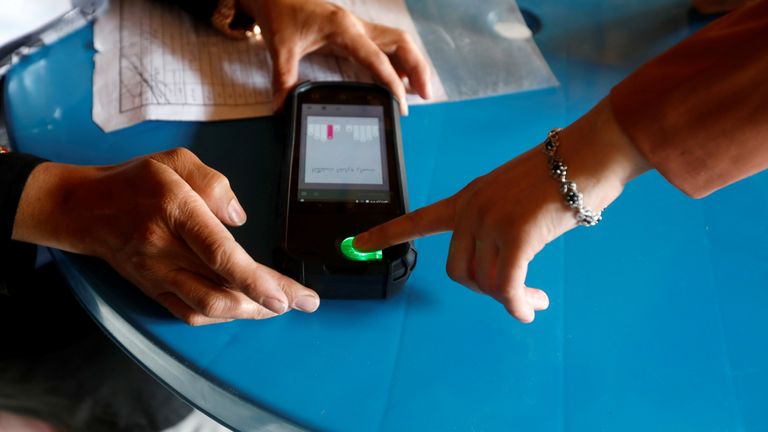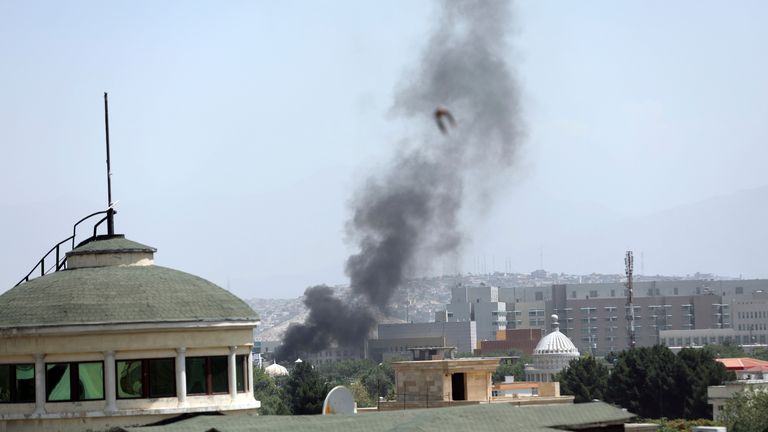Afghanistan: The biometric, social and organization info the Taliban could use to concentrate on remaining-driving Afghans | Environment Information
7 min readConcerns are mounting that the Taliban has received obtain to wide quantities of particular data by means of former US military and Afghan govt databases that could let them to focus on civilians.
It would be the initially time the group has obtained the own details of Afghan civilians on these kinds of a scale.
Afghans are also racing to erase social media profiles, even though international organisations scramble to delete any remaining proof that could reveal information on the locals they have labored with over the earlier 20 a long time.
And with stories that documents determining task applicants and Afghan staff ended up remaining exterior the British embassy, the risk of figuring out info slipping into the erroneous palms is much more actual than ever.
But what information could the Taliban access and what could it imply for Afghan civilians?
Biometric details
At least 3 electronic id methods working with biometric knowledge are acknowledged to have been operated recently in Afghanistan, in accordance to digital human legal rights team Entry Now.
One of them – the Handheld Interagency Identification Detection Equipment (HIIDE) – was originally operated by US forces as a means of gathering iris, fingerprint and facial scans of criminals and insurgents in the course of the war.
But it was afterwards used to log the knowledge of Afghans aiding the US between others, with investigative reporter Annie Jacobsen reporting that the Pentagon aimed to acquire biometric knowledge on 80% of the Afghan inhabitants.
Experiences show that HIIDE products – and as a result the massive centralised databases of individual facts they are linked to – was seized by the Taliban past week.
It’s not acknowledged how numerous people’s sensitive, pinpointing data can now be retrieved by the team as a outcome.
The repercussions could be deadly, with reviews that Taliban fighters are likely home to residence to discover individuals who labored with foreign forces.
But there are also less immediate implications which could possibly cease men and women hiding from the Taliban from accessing products and services this kind of as health care and more schooling, according to Brian Dooley of Human Rights Initially, a US-primarily based human rights group.
“Will folks want to go to healthcare facility if they know that when they occur into get hold of with the authorities, they will have accessibility to biometric knowledge and you can find no hiding who you are, and what your history was?” he advised Sky Information.
Human Legal rights Initially have manufactured guides on how to erase electronic record and evade misuse of biometric data.
Two government-operate biometric databases were also a short while ago operational in Afghanistan: the controversial e-Tazkira identification cards and US-supported Afghanistan Automatic Biometric Identity Process.
“I assume it truly is likely sensible to believe that the Taliban have obtained their arms on almost everything that the Afghan government experienced a pair of weeks ago, which was a large amount of info on people today,” said Mr Dooley.
The 2019 Afghan election, for case in point, applied voter verification machines with fingerprint, eye and facial recognition abilities in a bid to suppress election fraud.
Accessibility Now also estimates that there may possibly be various other digital id systems employing biometrics held by humanitarian organisations like the UN and Globe Food stuff Programme.
Lots of of these worldwide teams are now racing to do what they can to safe the info they have gathered.
Carolyn Tackett, deputy advocacy director at Access Now advised Sky Information:
“For humanitarian organizations like the Worldwide Business for Migration (IOM) and the Earth Food System (WFP) that have embedded biometrics into their assistance shipping and delivery, they are now struggling with tough choices about how to minimise info data and entry factors that place people in threat, although also seeking to keep their programmes in assistance of thousands and thousands in Afghanistan facing displacement, foodstuff insecurity, poverty, and much more.”
And although Ms Tackett does not have proof of global organisations’ databases becoming compromised, she mentioned “time is of the essence” when it will come to securing data.
“It is regular form all-around the globe for host governments to involve entry to [international organisations’] databases for uses of migration, regulation enforcement, and a lot more,” she said.
“And it is likely only a make a difference of time before the Taliban present them with the similar ultimatum.”
Social media
Since 10 August, lots of Afghans have scrambled to remove traces of their past life on social media for fear of retribution by the Taliban.
This consists of the countless numbers of people today who either worked immediately with international forces as interpreters or worked in adjacent organisations in the decades because US forces entered the nation.
Abdul labored as a contractor for a Western protection business. His title has been improved to guard his id.
He advised Sky Information that on the 1st working day the Taliban took in excess of he deleted all the things from his Fb, WhatsApp and Instagram. He deleted his LinkedIn in the subsequent times.
He’s anxious that his connection to a Western company may make him a goal of the Taliban.
“I deleted everything belonging to my vocation – even my birthday wishes from expats, who had been mostly United kingdom citizens,” he stated.
He advised Sky News he felt “worried, shameful and disgraced” to have to do it.
“It was from the commitments I designed to my buddies,” he explained.
It is a emotion shared by several Afghans who have had to erase proof of their achievements for anxiety of reprisals.
Fatimah Hossaini, a journalist and women’s activist, shared an picture of herself and three other female Afghan colleagues deleting their electronic record in the days following the Taliban’s capture of Kabul.
She posted: “The very last times in Kabul whilst we, four pals, Afghan women of all ages journalists had been hiding ourselves in d home. we had been deleting our posts & profiles & no matter what we accomplished above past two a long time. Taliban fighters ended up outdoors & patrolling d region. Emotion broken & traumatized.”
She has considering the fact that fled the state.
But not everybody may want to – or be able to – erase their on the internet identification.
“For some people today, it is a terrible problem. Their ticket out is to be ready to prove that they have some partnership with American forces or British forces, for illustration. If they delete that, it may possibly be far more unsafe for them,” explained Brian Dooley.
Twitter, Facebook and LinkedIn have all rolled out tools to limit who can see Afghan users’ profiles and connections.
Information and facts held by organizations
Even though information on the web can be erased at the click of a button, sensitive documents saved in offices all through Afghanistan are significantly tougher to demolish.
The velocity the Taliban captured Kabul suggests many did not have time to reduce proof which – in the eyes of the Taliban – incriminates them.
Abdul was in his office environment on the day that the team descended on Kabul.
But on hearing the information he still left, terrified.
His private profile on the office admin information ended up remaining driving, as nicely as the obligation roster with employees’ names on them.
“Each individual minute I assume about it and what comes about to me if they find me. It truly is hard to envision how cruel they are,” he mentioned.
It follows the discovery by a journalist of CVs and career purposes strewn on the ground outside the house the British Embassy in Kabul, with names and pinpointing facts evidently visible.
Many others have lifted problems about the risk of the Taliban accessing get in touch with logs and spot data of persons, which are stored by telecoms providers.
Though the possibility posed by this information and facts slipping into the wrong fingers is serious, industry experts estimate that there is nevertheless some time for some organisations to prevent the Taliban getting entry.
“They have got their fingers full by imposing their authority on a nation. I suspect that large-scale tech detection is not what they are heading to be doing on working day 4 or 5. But possibly week 4 or 5,” mentioned Mr Dooley.
The Info and Forensics crew is a multi-proficient device committed to offering transparent journalism from Sky News. We gather, analyse and visualise data to inform facts-driven stories. We merge standard reporting expertise with state-of-the-art examination of satellite photos, social media and other open source facts. Via multimedia storytelling we goal to superior clarify the planet when also showing how our journalism is completed.








